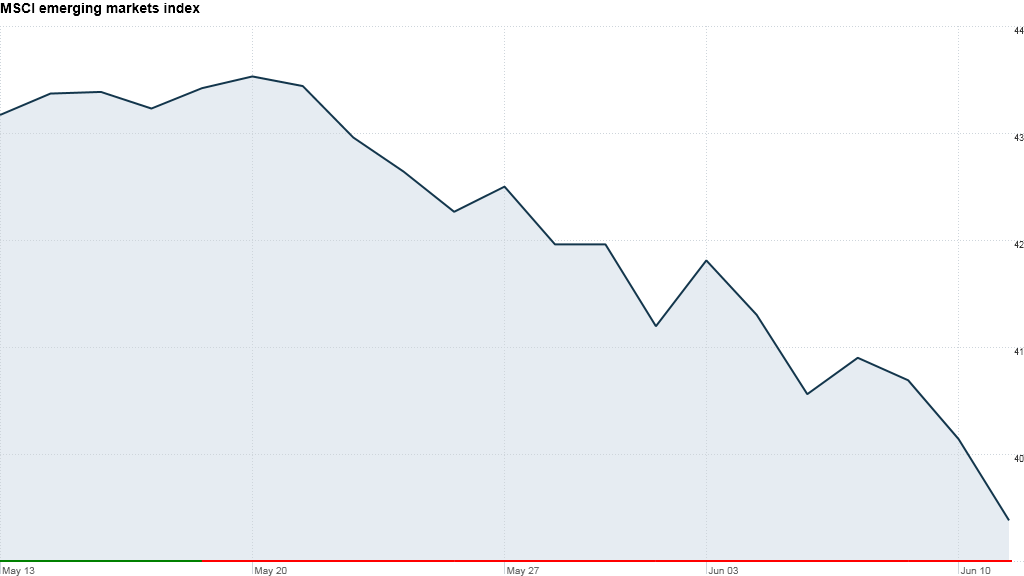Investors have been fleeing emerging markets as they seek safer havens and higher returns in the developed world.
Stocks, bonds and currencies have been volatile since early May, when investors started to get increasingly worried about when the Federal Reserve might start to pull back on its bond buying program.
The MSCI emerging markets index fund (EEM) has lost nearly 10% in just one month.
The flight from emerging markets accelerated Tuesday after the Bank of Japan left its monetary policies unchanged, dashing hopes for additional stimulus measures, said Kathy Lien, managing director at BK Asset Management.
"We've seen a global deleveraging," she said. "There are questions about central banks becoming more conservative and general concerns about economic growth in Asia."
Emerging markets have also been hit by weakness in commodity prices and local political issues, noted Capital Economics. Turkey, for example, has been rocked by protests that have sent the nation's markets into a tailspin.
Related: Investors losing patience with Turkey
As investors shy away from risk, the U.S. dollar has rallied against emerging market currencies, such as the Indian rupee, which fell to a record low this week, as well as the Thai bhat, Mexican peso and Brazilian real.
The currency volatility spilled over into stock markets in emerging Asian economies, including Indonesia, Thailand and Malaysia.

South Africa has been hit hard. The nation's currency fell to a four-year low this week before bouncing back, while South African government bond yields have surged and stocks have plunged.
Greece, which has been at the heart of the European debt crisis, was downgraded to emerging market status by equity index provider MSCI early Wednesday. That marks the first time a developed country has been demoted.
Click here to see current exchange rates.
Meanwhile, interest rates in the United States have risen as investors expect the U.S. economy to strengthen in the second half of the year.
Investors had been venturing into emerging markets in search of higher yielding assets, but the recent rise in U.S. rates has prompted many traders to unwind those positions.
"If you can get higher yield on riskless investment in U.S. Treasuries, that makes emerging markets look less attractive," said Brian Gendreau, market strategist at Cetera and a professor of emerging markets finance at the University of Florida.
The recent sell-off in emerging market assets is not necessarily a reflection of the underlying economic health of those countries.
Gendreau said studies have shown that about half of all capital flows in and out of emerging markets are linked to changes in economic growth and interest rates in developed nations.
Traders expect the volatility in emerging markets to continue in the near term, although some say the recent sell-off may present buying opportunities.
"Once the dust settles we expect there to be significant opportunities to be aggressive on fresh risk, but it is too early to put those positions on yet," Jens Nordvig, investment strategist at Nomura Securities, said.



